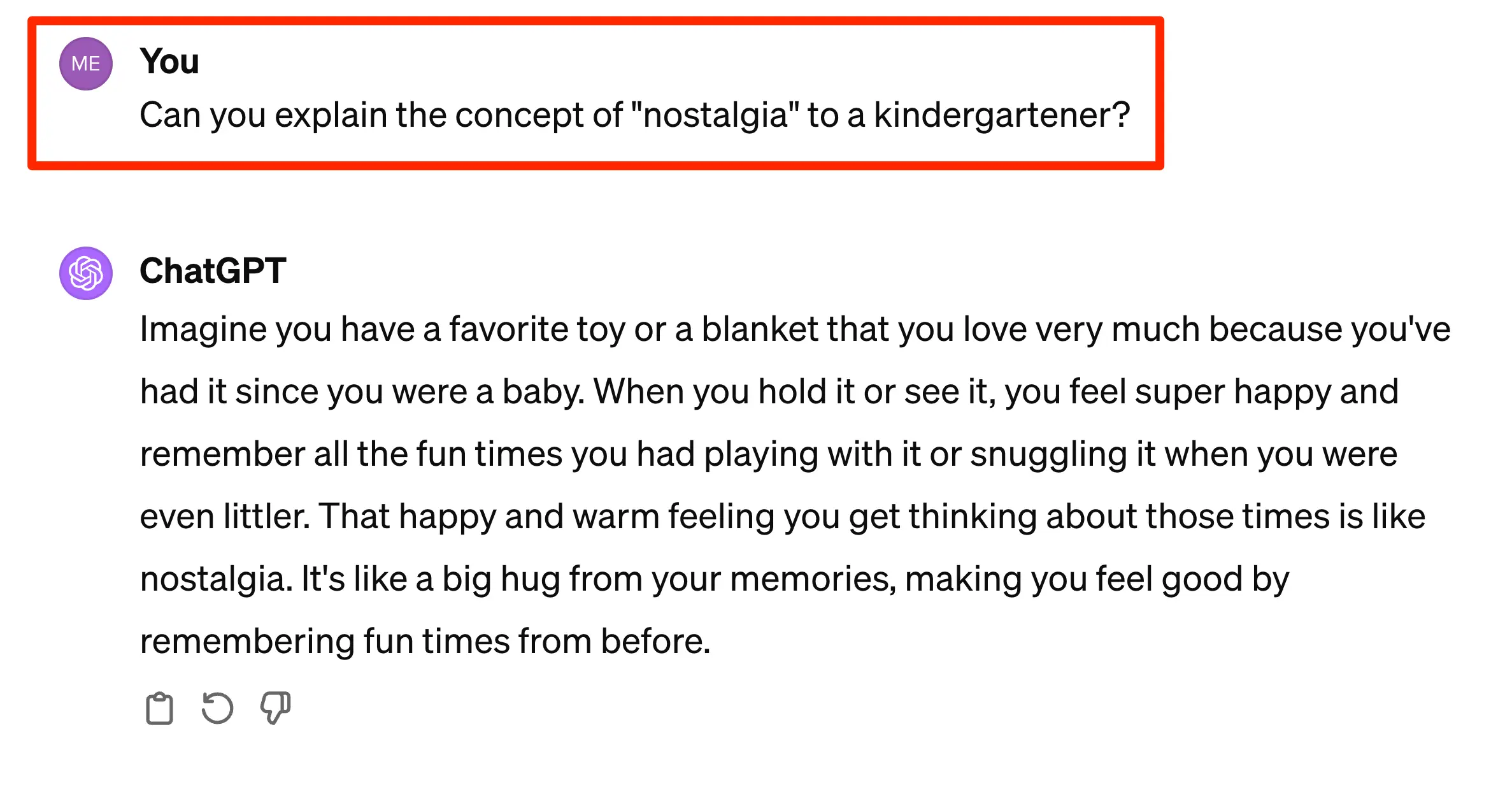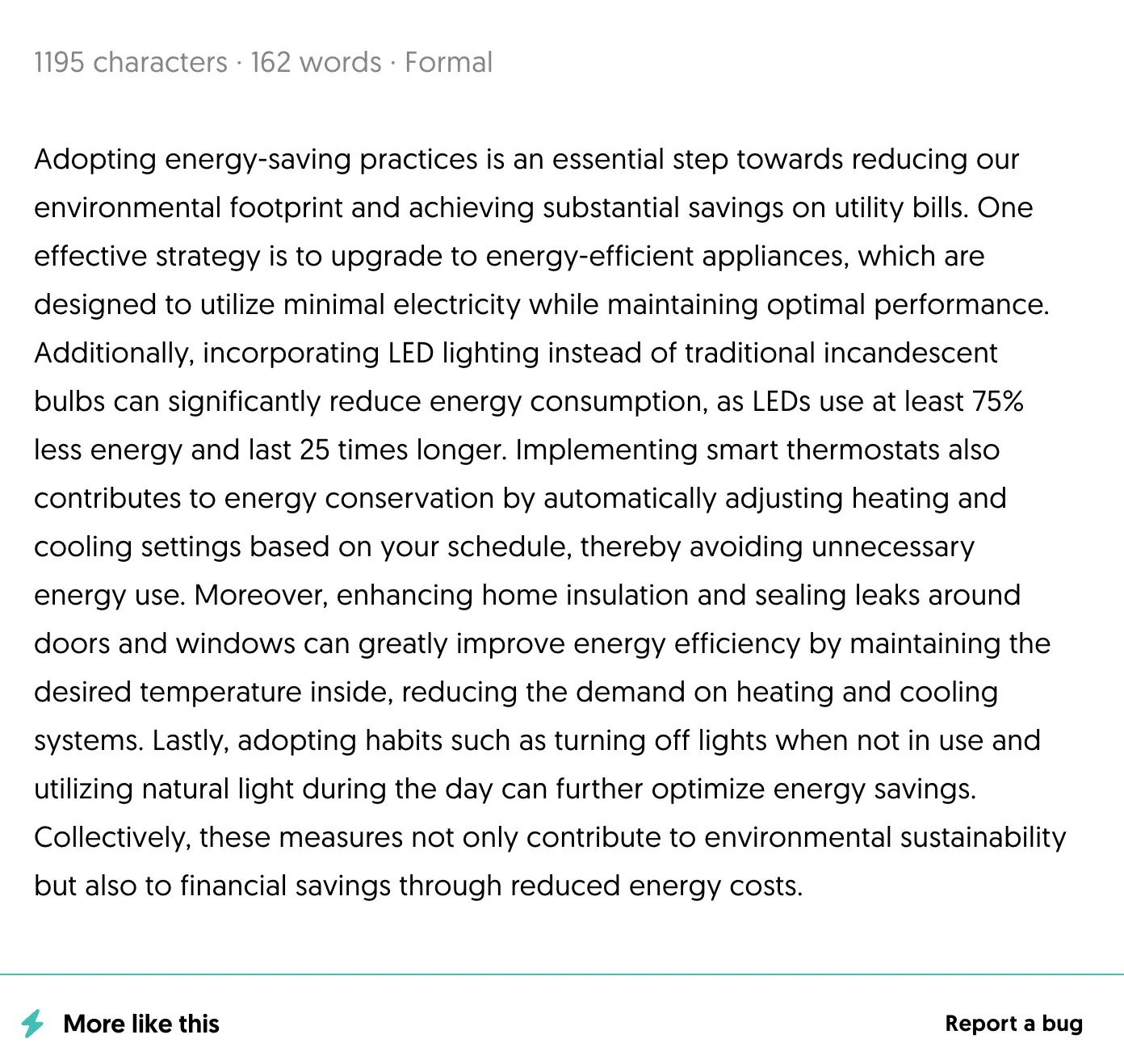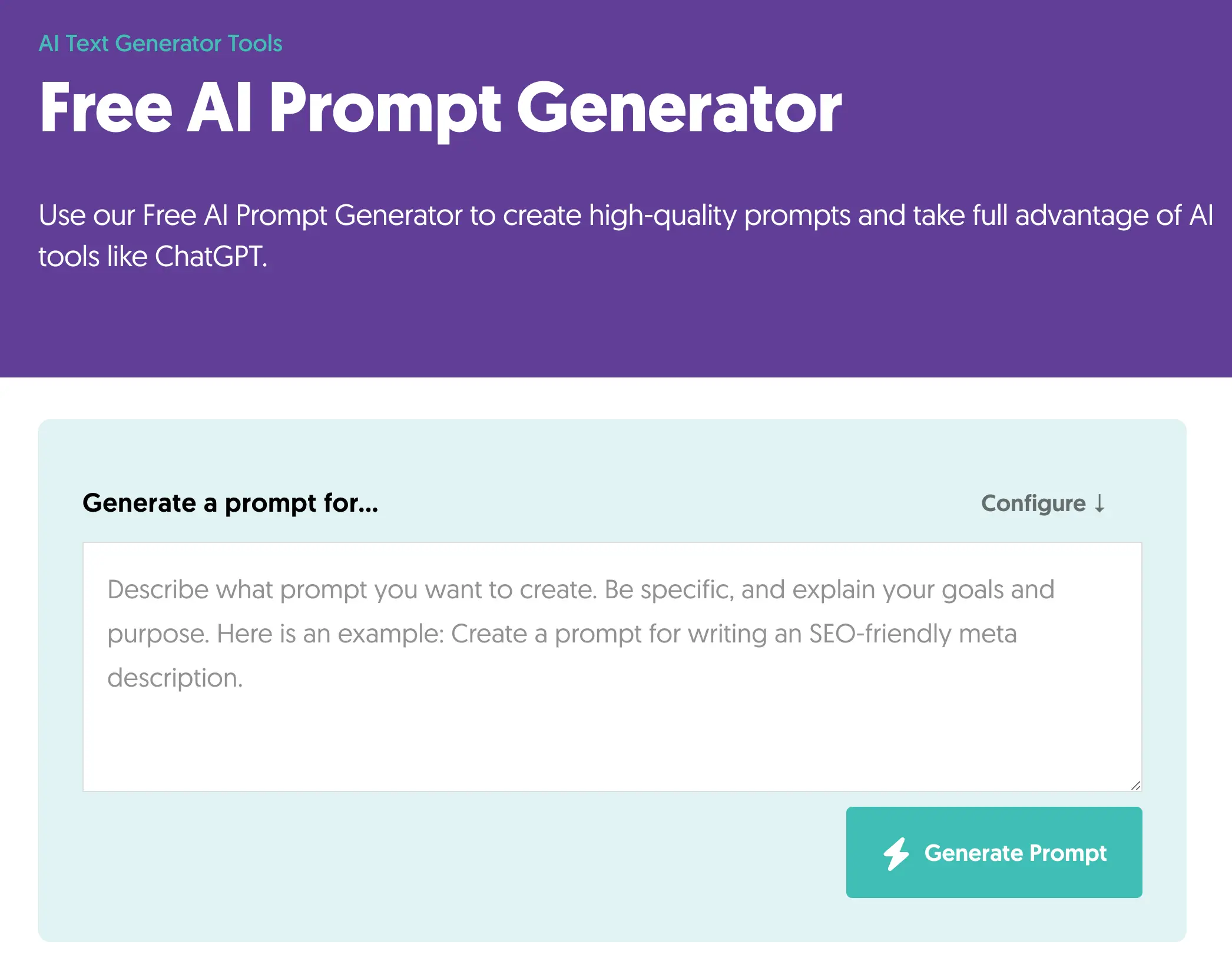- What Is Prompt Engineering?
- Why Is Prompt Engineering Important?
- Examples of Prompt Engineering
- Prompt Engineering Best Practices
- What Does A Prompt Engineer Do?
- What Skills Are Needed For Prompt Engineering?
- How To Become a Prompt Engineer
- What Is The Average Salary For Prompt Engineers?
- Learn More About Prompt Engineering
What Is Prompt Engineering?
Prompt engineering is the process of writing text prompts that generative AI models like ChatGPT, DALL-E, and Gemini can understand. It involves using the proper structure and language to get the most accurate and relevant results from AI.
A prompt is natural language text instructing a generative AI model to carry out a specific task. This could be to generate text or images, analyze data, write code, and many other tasks.
Here is an example of a prompt given to ChatGPT (for more examples of ready-made prompts visit our ChatGPT Prompt Library)

Why Is Prompt Engineering Important?
Prompt engineering is important for improving output from AI models. The quality and accuracy of AI-generated information largely depend on the input provided.
By building well-structured prompts, you can benefit from:
More Relevant Results - By fine-tuning prompts, you can guide the AI to understand the context better and produce more accurate and relevant responses. Different AI models have different requirements, and by writing good prompts, you can get the best of each model.
For example, writing prompts for ChatGPT differs from writing prompts for Gemini. ChatGPT is good for working with text but lacks updated information like Gemini. On the other hand, Gemini can be used to search your own data in Gmail and other Google products.
With the right prompt, you can guide the model to use the most relevant information to generate the best possible results.
Faster Responses - Sometimes, to get the most appropriate response from an AI model, you must give it multiple prompts and feedback. This process is time-consuming, and with prompt engineering, you can avoid trial and error and get the desired result faster.
Better Performance of AI Models - An AI prompt engineer can push AI models to get the best possible results by tailoring prompts that align perfectly with the model's capabilities and limitations. AI models tend to be lazy sometimes and 'refuse' to do the work you want, but with the right prompts, you can get them to do more and get the desired results.
Examples of Prompt Engineering
To understand what prompt engineering is about, consider the following examples:
Prompts For AI Text Models like ChatGPT and Gemini
When you give an AI text model the following prompt: "Write a short paragraph on energy-saving tips.", you get this result:

When you engineer your prompt by making the instructions specific, like this: "Write a 200-word paragraph for beginners about the basics of energy-saving. Include 4 tips in a list format on reducing waste and conserving energy."
You get this result, which is more meaningful and relevant to your request.

We've used our AI paragraph generator in the above examples, but you can test the prompts on ChatGPT or Gemini and compare the responses.
Here is another example you can test:
- Basic Prompt: "Explain photosynthesis."
- Engineered Prompt: "Explain the process of photosynthesis to a 10-year-old, using simple language and examples, such as how a plant uses sunlight to make food."
Prompts For Image Models Like DALL-E
Prompts are not only important for text, but they are critical for images (and soon video). Consider these examples for generating images with DALL-E.
When you give DALL-E this generic prompt: "Create a digital artwork," you get a nice but generic image.
When you give it this engineered prompt: "Create a digital artwork inspired by the concept of 'time travel,' blending elements of futuristic technology with historical landmarks in a surreal landscape."
You get this, which is exactly what was requested:

Prompt Engineering Best Practices
Follow these tips when engineering your AI prompts:
1. Understand What The Specific AI Model Can Do
To effectively utilize the capabilities of the AI model, you need to familiarize yourself with its strengths and limitations. This will enable you to craft prompts that align with the model's abilities, ensuring more accurate and relevant responses.
Here is a summary of the most popular AI models and what they are good at:
- ChatGPT, Google Gemini, and Microsoft Copilot: They can create different types of content from text prompts. They can generate text, code, perform analysis, create images, and more.
- DALL-E, Midjourney: AI Models specialized for image generation. They can turn your words into high-quality, imaginative visuals (like the example above).
- GitHub Copilot: Great for generating code. Guthub Copilot is an AI code completion tool that suggests lines of code based on your current context.
- Jukebox: OpenAI's music generation model can create music from text prompts.
2. Provide All Required Details
It is important to make your prompts specific but, at the same time, to give AI as many details as possible. A good prompt should have the following:
Clear objectives - Ensure your prompts clearly state what you ask the AI to do. Ambiguity can lead to irrelevant or broad responses, so be specific about your requirements.
Natural language - Use plain, straightforward language in your prompts. AI models are designed to understand and generate human-like text, so a clear, concise question or statement will yield the best results.
Be Specific - Tailor your prompts with specific details or examples to guide the AI's responses.
Avoid jargon - Stick to terms and phrases that are widely understood to ensure clarity.
Here is an example of a detailed prompt: "Create an email targeted to seniors, inviting them to join a webinar on the use of AI. Give 3 examples of how AI can be used to make their lives easier. Don't use more than 200 words. "
3. Provide Feedback and Follow Up Instructions
One of the tricks of helping AI models to generate more accurate results is to provide feedback and follow-up instructions by clearly communicating what the AI did right or wrong in its response.
Offer detailed corrections or adjustments to help the AI learn from its mistakes and better understand your expectations. For example, when asking AI to write text, tell AI what changes you have made to the generated output and why.
Sometimes, AI text generator tools use complicated words that a human wouldn't use, and the best way to guide them in writing more like you is to give them feedback and examples.
4. Experiment With Different Prompts
One of the best ways to improve your prompts is experimentation. Testing different prompts allows you to find what works best for your needs and the particular model. Don't be afraid to test your ideas; the AI won't refuse your requests, and you'll get a chance to learn what's working best.
5. Ask The AI For Help!
Don't forget that the AI can also help you with prompt writing. Explain what kind of prompt you want to create, and AI can suggest the most appropriate structure and style.

Use our free AI prompt generator to get examples and prompt generation ideas.
What Does A Prompt Engineer Do?
An AI prompt engineer is an expert in using AI platforms by writing prompts that can be correctly interpreted and understood by large language models (LLM).
Part of the job responsibilities include:
- Crafting Clear and Effective Prompts
- Testing and Refining Prompts
- Understanding AI Capabilities
- Interpreting AI Responses
- Training Users on Prompt Engineering
- Collaborating with AI Developers
- Ensuring Ethical Use of AI
- Using programming to analyze and assess data quality.
What Skills Are Needed For Prompt Engineering?
Despite being a relatively "new" profession, there are already thousands of new job positions for Prompt Engineers. Indeed lists 3800 jobs in the US alone. Based on the requirements of these jobs, to become a prompt engineer, you'll need the following skills:
- Know the fundamentals of Natural Language Processing (NLP) and how AI models work.
- Python Programming (Python is used heavily in LLMs)
- Practical experience with Chatbots and Generative AI models
- Background in Machine Learning
- Experience in NLP techniques
Some companies also require candidates to have a Computer Science or Software Engineering degree.
How To Become a Prompt Engineer
Becoming a prompt engineer is an excellent career choice. It's a field that will expand dramatically in the coming years and create new job opportunities for people who want to be actively involved with AI technologies.
To get started, follow these steps:
1. Understand the Basics of AI and Machine Learning
Start with foundational knowledge in artificial intelligence (AI) and machine learning (ML). Learn about different AI models, how they are trained, and their applications.
This free course by Google and this guide from Open AI will help you learn the basics of prompt engineering.
2. Get Hands-On with AI Models
Experiment with online AI models like OpenAI's GPT and Google's Gemini. Test different prompts, observe the outputs, and understand how different prompts can alter the results significantly.
3. Learn Programming and Scripting
Familiarize yourself with programming languages, such as Python, commonly used in AI and data science. Understanding how to write scripts to automate AI model interactions and process data efficiently.
4. Practice, Practice, Practice
The key to becoming a good prompt engineer is practice. Use AI to perform various tasks like generating text, automating tasks, analyzing data, or creating your own custom chatbot. Experiment with different prompts to see what works best for different applications.
5. Prompt Engineering Courses And Certifications
Consider enrolling in a course if you want to follow a more structured learning approach. There are plenty of options like the ones listed below. The cost is low, and you can get a certification to enrich your CV.
- Generative AI Fundamentals Specialization (IBM)
- Prompt Engineering Specialization (Vanderbilt University)
- AI for Everyone (DeepLearning.AI)
What Is The Average Salary For Prompt Engineers?
The average salary of a prompt engineer in the US is $72,000. According to ZipRecruiter, salaries range from $47,000 to $88,000 annually.



